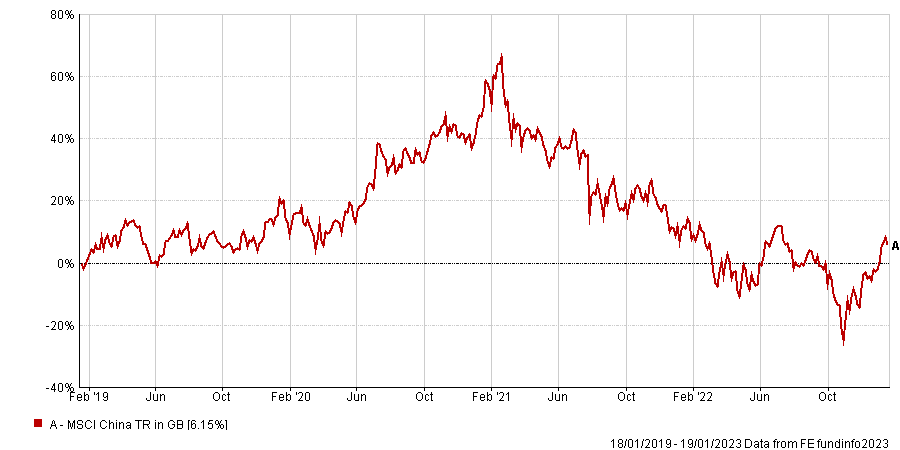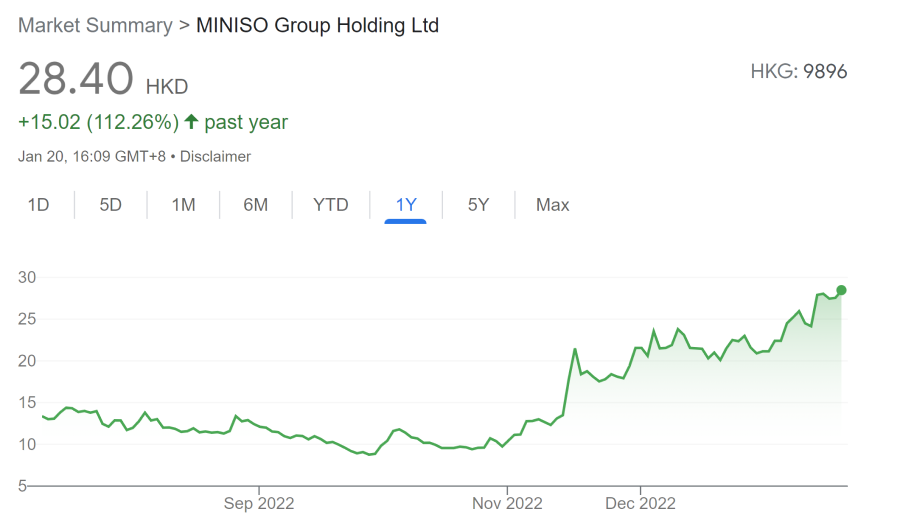Carmignac is taking a high-conviction approach to China, as its allocation to the country in the emerging markets portfolio Carmignac Emergents has reached 43%, a large overweight versus the 35% of its benchmark.
For a long time, news on China has been focused on regulatory pressures and the real estate crisis, zero-Covid and political tensions with the US, all of which made investors nervous about the country and caused the MSCI China index to fall 55% from its peak in February 2021 to October 2022.
Since then, most of these controversial measures have been discontinued in a surprising U-turn by the government, which ceded to demonstrations to reopen the country after three years of harsh Covid-19 lockdowns.
Despite the small rally since the end of last year, illustrated below, Haiyan Li-Labbé, manager of the Carmignac Carmignac China New Economy fund, believes there’s still room for Chinese equities to ascend in the new year, despite the lingering political tensions with the US (which have somewhat relaxed since the November summit in Bali).
Performance of index over 4yrs

Source: FE Analytics
Investors can find “reasonable valuations” in the Chinese market and better growth than in developed countries from this year and into the next, she said.
In particular, she sees four main drivers of growth: the healthcare industry, technology innovation, the ecological transition and consumption.
It’s easy to understand why, after three years of lockdown and little chances to spend their money, Chinese people will want to increase their expenditures from now on, explained Li-Labbé.
But other areas, perhaps, might require an explanation. The ecological transition, for example, isn’t the first area that investors tend to associate with China, but is gaining importance for the country as a way to become more energy independent.
“China is very dependent for their energy, which they import in the form of oil and gas, mainly paying in US dollars. So to become more independent, on the one hand, they entered energy purchase contracts with specific countries which they pay directly in renminbi,” the manager said.
This is often referred to as an attempt of de-dollarisation of Chinese economy, whereby the country is cutting their dollar reserves and filling up on gold.
“But this transition will be very slow and the dollar will still dominate in the near term. So the second solution is to develop renewable energies. China has unlimited manufacturing capabilities. It doesn't have enough oil, but can develop wind and solar farms and hydrogen strategies to power cars. And that’s why China is developing an electric vehicle industry like crazy.”
One company that she finds attractive in this space is Anta, China’s leading sportswear brand that has been taking market share from Adidas, Nike and Puma in China.
“Chinese consumers are very proud of wearing Chinese brands, it's very different from 20 years ago, when people were admiring foreign brands. Today, Chinese goods are also of very good quality and good design,” the manager said.
Another company in the manager’s radar is Miniso, which is “the third most-successful Chinese company outside of China, after TikTok and Shein”, although it remains relatively unknown.
“Miniso operates a master franchise model, opening up stores in and outside China. The company works with designers and every week it launches 150 new cheap but good-quality products, which are welcome both in Europe and the US in the current high-inflation environment,” said Li-Labbé.
“They started to sell their stores in train stations in France and the UK as well. There are already more than 10 stores in Spain and Italy too. It's a very unique business model.”
The manager also saw Alibaba favourably as it’s trading at “very low” valuations.
Performance of stock over 1yr

Source: FE Analytics
Moving on to the energy transition, the manager recommended Sungrow, China’s biggest energy storage company; Longi, a developer of solar power projects; the US-listed Daqo, a polysilicon manufacturer for use in solar photovoltaic systems; and finally Ningbo Orient Wires & Cables, a “leader” in making cables for energy transmission.
As for tech companies, for investors who don’t want to miss out on TikTok’s success, Li-Labbé suggested buying Chindata, which operates Byte-dance (Tik Tok’s master company) data centres.
You can't buy Byte-dance because it's a private company, but you can buy their services provider Chindata.
Finally, Fulltruck is “the Uber for truck drivers and merchants”.
“It's an app which matches demand and supply, making the transportation of merchandise, which was still analogue, much more efficient,” explained the portfolio manager.
“As a merchant, you put your job offer on the app, drivers view and accept it and once they have reached their destination, they accept another offer on their way back. This way, the truck is never empty, having less impact on the environment and benefitting the driver too, who will be paid for two deliveries instead of one.”





